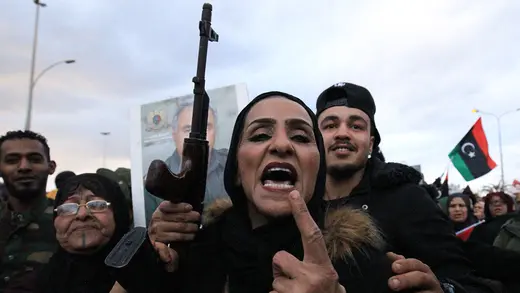In Brief
What’s at Stake in Libya’s War?
The war between Libya’s rival governments is intensifying as more countries wade into the conflict, and analysts fear that a proxy war is brewing in the North African nation.
Libya has been divided between dueling governments since 2014. Currently, Prime Minister Fayez al-Serraj’s UN-recognized Government of National Accord (GNA) seeks to hold the capital, Tripoli, against rebel forces led by former General Khalifa Haftar. Haftar’s newest offensive—and the flood of drones, other weapons, and money accompanying it—has raised fears that the conflict is escalating into a proxy war between outside powers scrambling to control the Mediterranean.
What’s the state of the conflict?
The United Nations, as well as Russia and Turkey, have tried to mediate the conflict. The two sides have agreed to an informal cease-fire as well as peace talks in Berlin. Moscow hosted its own surprise talks ahead of the Berlin summit.
More on:
Tensions have mounted since April 2019, when Haftar’s Libyan National Army (LNA), based in the country’s east, moved to capture Tripoli. Despite Haftar’s initial advances, the result has so far been a stalemate.
How did we get here?
Libya has been riven by fighting between competing factions since 2011, when the former dictator Muammar al-Qaddafi was toppled by an armed uprising during the Arab Spring. The anti-Qaddafi forces were aided by a North Atlantic Treaty Organization (NATO) intervention, which was authorized by the UN Security Council with a mission to protect civilians.
The resulting transitional governments failed to restore order. In 2014, Haftar demanded the dissolution of the government in Tripoli, having secretly raised an army and established a rival seat of government in eastern Libya.
Who are the major international players?
Turkey. Ankara backs the GNA, and it has started to send troops to Tripoli after providing only weapons for the past year. Experts say Ankara means to leverage its relationship with Tripoli to reassert itself as a major power in the Eastern Mediterranean.
Egypt, France, and United Arab Emirates (UAE). These countries are the major supporters of the LNA, which says it might ask for direct intervention by Egypt’s armed forces. The UAE already provides the LNA with the cheap, Chinese-made drones that distinguish Haftar’s offensive. France has seemingly broken ranks with other European countries by tacitly backing Haftar, seeing him as a bulwark against terrorist groups.
More on:
Russia. Moscow’s behind-the-scenes support for Haftar includes blocking UN condemnations of the LNA and helping to finance the group. Additionally, Libyan and U.S. officials say mercenaries from the Russia-based Wagner Group are fighting for Haftar.
European Union and United Nations. The EU struggles to maintain a united front, particularly due to divisions between France, which is sympathetic to Haftar, and Italy, which has supported the GNA. Meanwhile, the UN mission in Libya has worked to facilitate peace talks.
United States. Washington’s role has been limited to occasional air strikes targeting members of the self-proclaimed Islamic State. However, President Donald J. Trump has praised Haftar, casting doubt on U.S. support for Tripoli.
What’s at stake?
Chaos in Libya has intensified the Mediterranean migrant crisis and raised the specter of terrorism, while creating a rush for control of the country’s economic resources.
The crisis has displaced 340,000 people and led to nearly 300 civilian deaths since the start of 2019, caused mostly by drone strikes. Despite a UN arms embargo, the inflow of drones and other weapons continues, and fears persist that terrorist organizations could regroup. The fighting also threatens to push more migrants to attempt the perilous sea journey from Libya to Europe. Italy, which receives the bulk of those arrivals, controversially struck a deal with the GNA to keep would-be migrants in Libya. The conflict has benefited human traffickers, who have reportedly intercepted millions of dollars in EU aid meant to help migrants.
Then there is the country’s oil wealth. Libya’s oil and gas reserves, estimated to total forty-eight billion barrels, are the largest in Africa and the ninth largest globally. The country’s National Oil Corporation (NOC) produces around 1.3 million barrels per day. Analysts say Russia could see a Haftar victory as an opportunity to gain oil export contracts, although the NOC says it takes no side in the conflict.
Turkey, meanwhile, is hoping to use its support for the GNA to win economic influence over Libya and, eventually, the Eastern Mediterranean. To counter growing ties among Cyprus, Egypt, Greece, and Israel, Turkey and the GNA agreed in December to share an “exclusive economic zone” stretching from Turkey’s southern shore to Libya’s northeastern coast. Opponents to the deal say it is illegal and that it could disrupt trade and energy flows.
 Online Store
Online Store
